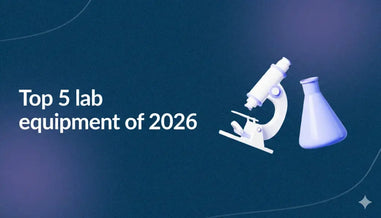- No products in the cart.
In the world of scientific research and laboratory work, precision and accuracy are paramount. When it comes to storing temperature-sensitive samples and materials, having the right lab refrigerator can make all the difference. In this comprehensive guide, we will walk you through the essential factors to consider when choosing the perfect lab refrigerator for your specific needs.
Why Choosing the Right Lab Refrigerator Matters
Before diving into the selection process, it's crucial to understand why selecting the right lab refrigerator is so important:
1. Temperature Stability
Lab refrigerators are designed to maintain precise temperature control. Variations in temperature can jeopardize the integrity of your samples, chemicals, and reagents, potentially leading to skewed results or wasted resources. The right lab refrigerator ensures that your materials remain at the desired temperature consistently.
2. Sample Protection
In a laboratory setting, samples are often irreplaceable or expensive to reproduce. Lab refrigerators provide a controlled environment that protects these valuable assets from degradation, contamination, or spoilage.
3. Regulatory Compliance
Many labs must adhere to specific regulatory guidelines, such as Good Laboratory Practices (GLP) or Good Manufacturing Practices (GMP). Selecting the right lab refrigerator ensures compliance with temperature monitoring and data recording requirements.
4. Energy Efficiency
Energy-efficient lab refrigerators not only reduce operational costs but also have a lower environmental impact. Sustainable practices are becoming increasingly important in laboratories worldwide.
5. Longevity
Investing in a high-quality lab refrigerator can pay off in the long run. A durable unit can last for years with proper maintenance, providing reliable storage and minimizing replacement costs.

Factors to Consider When Choosing a Lab Refrigerator
Now that we understand the importance of choosing the right lab refrigerator, let's explore the key factors to consider during the selection process:
1. Temperature Range and Control
Different laboratory applications require specific temperature ranges. Ensure that the refrigerator you choose can achieve and maintain the precise temperatures your research demands. Look for models with accurate digital temperature controllers.
2. Size and Capacity
Evaluate the volume of samples and materials you need to store. Lab refrigerators come in various sizes, from undercounter units to large upright models. Choose one that comfortably accommodates your needs without wasting space.
3. Door Configuration
Consider whether a single or double door configuration suits your workflow better. Single-door models are more energy-efficient since they minimize temperature fluctuations when accessing the contents. However, double-door units provide better visibility and access to the stored items.
4. Shelving and Storage Options
Look for adjustable shelving to accommodate different-sized containers and maximize storage flexibility. Some lab refrigerators offer specialized storage options like pull-out drawers or racks designed for specific sample types.
5. Temperature Monitoring and Alarms
Invest in a lab refrigerator equipped with temperature monitoring and alarm systems. These features provide real-time temperature data and alert you if temperatures deviate from the set range, helping prevent sample loss or damage.
6. Energy Efficiency
Choose an energy-efficient refrigerator to minimize operational costs and reduce your laboratory's environmental footprint. Look for units with ENERGY STAR certification or those designed with energy-saving technologies.
7. Door Locks and Security
If you work with sensitive or hazardous materials, consider a lab refrigerator with locking mechanisms to prevent unauthorized access. Security is especially critical in research environments with strict access control requirements.
8. Noise Level
In some lab settings, noise can be a significant concern. Check the noise level specifications of the refrigerator and ensure it aligns with your lab's comfort and functionality requirements.
9. Brand Reputation and Warranty
Opt for reputable brands known for manufacturing reliable lab equipment. Additionally, review the warranty terms and conditions to understand the coverage and support provided in case of malfunctions or issues.
10. Budget Considerations
While quality and suitability should be your primary concerns, consider your budget constraints when making a final decision. Remember that investing in a high-quality lab refrigerator can offer long-term benefits and reduce the total cost of ownership.
Common Types of Lab Refrigerators
Before making your final decision, it's essential to be aware of the different types of lab refrigerators available:
1. General-Purpose Lab Refrigerators
These refrigerators are versatile and suitable for a wide range of laboratory applications. They are often used for storing reagents, chemicals, culture media, and other common lab materials.
2. Explosion-Proof Lab Refrigerators
Designed for hazardous environments, explosion-proof lab refrigerators are engineered to prevent electrical sparks and meet strict safety standards. They are commonly used in laboratories handling volatile or flammable substances.
3. Pharmacy and Vaccine Refrigerators
These refrigerators are specially designed to store temperature-sensitive medications, vaccines, and biological samples. They typically feature precise temperature control and alarming systems to ensure compliance with regulatory guidelines.
4. Ultra-Low Temperature Freezers
For storage of extremely temperature-sensitive materials, ultra-low temperature freezers can reach temperatures as low as -80°C. They are commonly used in research involving biological samples and proteins.
Maintenance and Care
Once you've selected the right lab refrigerator, it's essential to maintain it properly to ensure its longevity and reliability. Regular cleaning, temperature monitoring, and servicing as per the manufacturer's recommendations are crucial steps in preserving the performance of your lab refrigerator.
In conclusion, choosing the right lab refrigerator is a critical decision that can significantly impact the success of your laboratory work. By carefully considering factors like temperature control, size, and energy efficiency, you can make an informed choice that aligns with your research needs and budget. Remember that investing in quality lab equipment is an investment in the quality and reliability of your research results.
Conclusion
In conclusion, choosing the right lab refrigerator is a critical decision that can significantly impact the success of your laboratory work. By carefully considering factors like temperature control, size, and energy efficiency, you can make an informed choice that aligns with your research needs and budget. Remember that investing in quality lab equipment is an investment in the quality and reliability of your research results.
Whether you're working with sensitive biological samples, pharmaceuticals, or chemicals, the right lab refrigerator is a cornerstone of your laboratory infrastructure. It provides the stable and controlled environment necessary for successful experimentation, research, and analysis.
For over 40 years, Lab Pro Inc. has been committed to delivering the highest quality lab equipment such lab refrigerators, lab supplies, Excelta hand tools, reagents, distance learning kits, and cleanroom PPE apparel. Renowned by global medical device companies and laboratories, we ensure exceptional quality in every product. Contact us online or call 888-452-2776 to learn more. Discover top-notch lab supplies and elevate your experiments today!













































Very Interesting, Good job and thanks for sharing such a good information..https://www.gaiascience.com.sg/